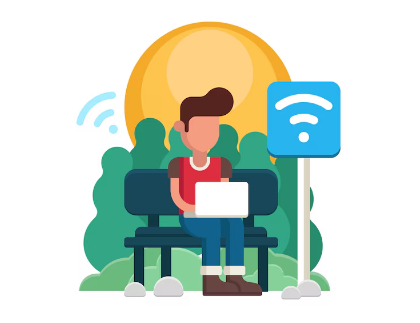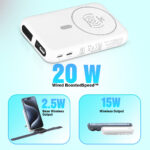In this blog, we’re diving into a common frustration—why your PC disconnects from Wi-Fi during large downloads. It’s an issue many face, but with the right approach, you can fix it. Whether you’re in the middle of downloading a massive game or important software, these disconnections can be incredibly annoying. Don’t worry though, we’ll guide you through practical solutions, from quick fixes to more detailed methods.
First, let’s cover some fast ways to resolve the issue.
Quick Fixes:
- Update Wi-Fi Drivers: Always keep your Wi-Fi drivers up to date to avoid performance issues.
- Disable Power Saving: Ensure your Wi-Fi adapter isn’t being disabled to save power by adjusting settings in Device Manager.
- Change Power Plan: Switch your power plan to High Performance, and tweak wireless settings for Maximum Performance.
- Check Router Settings: Update your router’s firmware and consider changing the Wi-Fi channel to a less congested one.
- Use Ethernet: If all else fails, plug in a cable for a more reliable connection during big downloads.
- Reset Network Settings: If configurations are messed up, a network reset can clear things up.
These are just starting points. If you need a more thorough guide, keep reading. For more information visit here https://assistme360.com/pc-disconnects-from-wifi-during-large-download/
Why Does Your PC Disconnect from Wi-Fi During Large Downloads?
There’s not a one-size-fits-all answer, but here are some of the key reasons:
Network Congestion: Large downloads hog bandwidth, and if your network is already crowded with other devices, your router might struggle to maintain a stable connection.
Router Limitations: Routers have their limits. Some models can only handle a limited amount of data or a certain number of devices at a time, which could be the reason for dropouts.
Wi-Fi Interference: Your Wi-Fi signal could be getting disrupted by other electronic devices, physical obstacles like walls, or even competing Wi-Fi networks in your area.
Driver Issues: Outdated or corrupt Wi-Fi drivers can cause connection instability. Keeping these updated is key.
Power Management Settings: Your PC might turn off your Wi-Fi adapter to save power during intense downloads, so make sure to disable this feature.
DNS and IP Configuration Problems: Misconfigured DNS settings or IP addresses can cause connection interruptions. A reset often fixes this.
Outdated Router Firmware: If your router’s firmware is out-of-date, it might not handle large downloads well. Update it to improve performance and stability.
VPN and Security Software: VPNs or aggressive security programs can mess with your Wi-Fi, especially during large downloads. Temporarily disabling them can help diagnose the problem.
Hardware Issues: Faulty hardware like an old Wi-Fi adapter or a worn-out router might be to blame. Testing different equipment could reveal if this is your issue.
Detailed Solutions to Fix the Problem
Now, let’s dig into specific methods with step-by-step instructions to help you get back to downloading without interruptions.
1. Update Wi-Fi Drivers
Drivers are crucial for maintaining a stable Wi-Fi connection. Here’s how to update them:
- Press Windows + X and choose Device Manager.
- Find Network Adapters, then locate your Wi-Fi adapter (it might be labeled something like “Wireless Network Adapter”).
- Right-click and choose Update driver.
- Select Search automatically for updated driver software.
- Once the update is complete, restart your PC to apply the changes.
2. Disable Power Saving
Sometimes, your Wi-Fi adapter is turned off to save power during high-bandwidth tasks. To stop this:
- Go to Device Manager and expand Network adapters.
- Right-click your Wi-Fi adapter and select Properties.
- Head to the Power Management tab.
- Uncheck Allow the computer to turn off this device to save power.
- Click OK and restart your PC.
3. Adjust Power Settings for Maximum Performance
If your PC is set to a power-saving mode, it can throttle your Wi-Fi adapter. Fix this by:
- Search for Power Options in the Start menu.
- Choose Change plan settings next to your active power plan.
- Click Change advanced power settings.
- Find Wireless Adapter Settings, and set it to Maximum Performance.
- Apply the changes and restart your computer.
4. Disable Metered Connection
If your PC treats your Wi-Fi as a metered connection, it may limit bandwidth for downloads. Turn this off by:
- Press Windows + I to open Settings.
- Go to Network & Internet > Wi-Fi > Manage known networks.
- Select your network, then click Properties.
- Make sure Set as metered connection is turned off.
5. Reset Network Settings
Resetting your network settings can resolve any configuration errors:
- Open Settings and go to Network & Internet.
- Choose Status from the sidebar.
- Scroll down to Network reset and click it.
- Confirm the reset, and restart your computer.
6. Check Router Settings
Routers need love too. Here’s how to optimize yours:
- Log in to your router by entering its IP address in your web browser (often something like 192.168.1.1).
- Look for a Firmware Update option and make sure your router is running the latest version.
- Go to the Wireless Settings and change the channel to one with less interference (Channels 1, 6, or 11 are good choices for 2.4 GHz networks).
- Save the settings and restart the router.
7. Use a Wired Connection
Sometimes, the easiest fix is going old-school with an Ethernet cable. It provides a more stable connection, especially for large downloads. Just connect the cable to your router and PC, then turn off Wi-Fi to ensure the wired connection is used.
8. Install a Download Manager
Download managers can handle large downloads more efficiently. They let you pause and resume downloads, minimizing interruptions. Try options like Internet Download Manager (IDM) or Free Download Manager.
Conclusion
Wi-Fi disconnections during large downloads can be frustrating, but they’re fixable. Whether you need to update drivers, adjust power settings, or check your router’s firmware, the steps we’ve outlined can help stabilize your connection. If all else fails, using a wired connection or a download manager can provide a reliable workaround. Follow these steps, and you should be able to enjoy uninterrupted downloads from here on out!
This post was created with our nice and easy submission form. Create your post!





